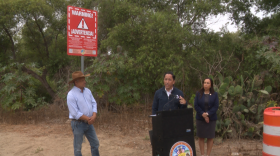The San Diego City Council wants to have more of a say in next year's budget. Council President Tony Young is proposing budget cuts to the mayor. We discuss why the council is being more proactive in budget negotiations this year. And, we'll talk about the dueling pension reform measures that could appear on the ballot in 2012.
Guests
Scott Lewis, chief executive officer of voiceofsandiego.org
Michael Smolens, government editor for the San Diego Union Tribune
David Rolland, editor of San Diego CityBeat
Read Transcript
This is a rush transcript created by a contractor for KPBS to improve accessibility for the deaf and hard-of-hearing. Please refer to the media file as the formal record of this interview. Opinions expressed by guests during interviews reflect the guest’s individual views and do not necessarily represent those of KPBS staff, members or its sponsors.
TOM FUDGE: Earlier in the show we spoke of the fight to balance the state budget. Misery loves company, and there is plenty of misery to go around when it comes to budget shortfalls. The City of San Diego is also at odds over how to balance the books. The city needs to come up with 56 million dollars in either revenues or cut. Some members of the City Council are playing an aggressive role in trying to influence the process even prior to the Mayor's release of his spending plan. Meanwhile pension continues over what kind of pension reform can erase San Diego's long term pension deficit. More on that later. Scott Lewis, what do we mean when we say the council is taking a more proactive role in the budget process?
S. LEWIS: There are basically two things going on. One is this 56 million deficit that has to be closed by July so we can either protect the services that we have right now, or lower them even further. And the second issue is the concern over the structural deficit. This is the idea that the city is fundamentally not set up to take in as much money as it's set up to spend. So how is that going to change over the long term? On the first issue the City Council, led by Tony Young and new city councilman David Alvarez, have proposed a list of cuts. What is interesting about them is they are not necessarily red meat for their constituents. This is stuff that includes out sourcing and includes some difficult decisions for them. I have to tip my hat to them. It's easy to save if you are a Republican let's just cut, cut, cut. Easy as a Democrat to say tax, tax, tax. But it's not easy to step outside and embrace the other side's proposal. What is really happening now you have that long term issue, the structural deficit is being addressed in closed doors with City Councilman Kevin Faulconer and the Mayor Jerry Sanders negotiating with the Taxpayer's Association and the Lincoln Club, two fiscal conservative organizations. And they want to come up with a long term pension plan. There are two aspects to that. One would switch some or all of the future city employees, not current ones, to a 401K pension plan as opposed to a guarantied pension. That first aspect would raise the city's costs in the short term. The second aspect of what they're discussing is the really interesting one. That would put some kind of cap on the city's payroll. On the one hand the more right wing conservatives would want to cap everybody's individual pensionable salary, what actually counts to their pensions from now and five years going forward. On the other hand, the Mayor is proposing one which would just cap the overall payroll going forward which means you could just cut people as opposed to lowering or capping their salaries to keep under that cap. It's a very interesting discussion.
TOM FUDGE: When we are talking about the long term structural deficit problem, Scott, are we talking about pensions or talking about other stuff too?
S. LEWIS: There are three major looming liabilities the city faces that puts incredible pressure on the city government and leads to these cuts that we've been seeing from rolling fire station brown outs to cutting life guards to what not. The pension obligation, these benefits we have promised thse employees but never funded, retiree health care liabilities, benefits we promised by never funded. And then our deferred maintenance, he stuff we built but not maintained very well. Now we owe money to keep streets and buildings from falling apart. So those three pressures are suffocating city government, and that is why we are seeing all kinds of problems manifesting themselves from lower library hours, to streets filled with potholes to lifeguards being cut in certain places and what not.
TOM FUDGE: We are talking generally about the financial state of the city of San Diego. David Rolland what would you like to add to the conversation?
D. ROLLAND: I would like to a question to Scott because you understand this stuff better than I do. Isn't it true that the pension fixes, the tweaks they have already done since 2005, isn't it true it will result in about 12 or 13 years in a major drop in the amount of money that the City has to pay into the pension plan? By a huge amount. So I'm wondering if it's possible to see these latest this attempt to go to a more defined contribution plan rather than a defined benefit plan is sort of taking advantage politically to reach an ideological end?
S. LEWIS: That's a great point. Two years ago, or three years ago, the City made it so that if you are not a policemen or firemen and you join the City service you are going to have a much smaller pension than people who joined before you. And those reforms that were touted by the Mayor and former City leaders that was supposed to cap and fix it from this point going forward. Not only that, but there was a plan that said if you ever boost City pensions going forward, you have had to have a vote of the people. So it was sort of locked in. That's why this 401K idea, they want to switch all new employees now even worse to this 401K plan, but it doesn't really save that much money compared to what they'd moved new employees to. It is a political symbolic gesture, and that is illustrated even more by the fact that actually costs would go up if they switched all these employees to the 401K
TOM FUDGE: Costs would go up in the short term but in the long term they would go down dramatically.
S. LEWIS: [CHECK AUDIO] They won't release the numbers. The point is that's why they focused on this second aspect of pensionable pay cap. Somehow reining in what the pension what kind of pressure it will face in coming years. Because it assumes that people's salaries will grow over time, simply capping them is a major impact on the fiscal situation going forward. So how they do that is what is being negotiated right now.
TOM FUDGE: It gets complicated. Mr. Smolens, what would you like to say?
M. SMOLENS: All things pension are complicated. Looking at the larger picture, the Council empanelled this group to look at the City's revenues and fees and so forth. They came back and showed, as well all know but in concrete terms, how low the city is in charging various business fees and other fees for parking lots and things like that compared to other cities. Nobody expects San Diego to be in the league of like a San Francisco, but in some people's minds there is room to charge more money and get some revenue. They learned from the Prop D sales tax increase failure which was resoundingly defeated, there is no appetite to go there. The City's in a similar situation as Governor Brown is right now with all cuts budget. They are trying to figure out how to do that. The pension is one thing that chips away over the long term, but they're really in a fix trying to figure out how they get at that because there is not much they can do on the revenue side. People still think city government is fat. The things they can attack are being whittled down. We are shutting down fire stations temporarily.
TOM FUDGE: I want to ask one question about the long term effects of going to a 401K. I think we saw a report I think I attach the name Jay Goldstone to this, where he stated that by 2050 the City of San Diego would be saving billions of dollars a year if they went to a 401K.
S. LEWIS: You have to pair that with recognition that the City employees' union, the largest city employees' union, is not necessarily worried about this switch to a 401K for its employees. What it is already under is not that much better and it would force the City to get into Social Security. One thing we need to keep in mind is the defining debate right now isn't between Republicans and Democrats in San Diego. It's between Republicans and Republicans. There is this war machine on the right wing fighting the traditional establishment. How they work that out is going to be very interesting. It's a 56 million dollar deficit right now, but that is not considering restoring the fire stations or paying your full cost to the healthcare retiree liability that we face.
TOM FUDGE: With that let me thank our guests on the Editor's Roundtable. Michael Smolens is government editor for the San Diego Union Tribune. And David Rolland is editor of San Diego City Beat. And last but not least Scott Lewis is chief executive officer of voicofsandiego.org. And that is not an April fool's joke. I'm Tom Fudge. You have been listening to the Editor's Roundtable on KPBS.






